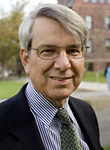Culler's literary theory work resounds around the world
By Linda Glaser

Twenty years ago, a young man in Romania wanted a copy of Jonathan Culler's book "On Deconstruction" so badly that he covertly evaded the secret police to gain illegal access to a Xerox machine.
Now a professor of English at the University of North Carolina, Christian Moraru still has the yellowed copies he made of Culler's book, which introduced the work of French philosopher Jacques Derrida and its implications to the English-speaking world, and beyond.
Most people do not have to risk the "unpleasant" interrogation Moraru later endured to gain access to the literary criticism of Culler, the Class of 1916 Professor of English and Comparative Literature and chair of Romance studies. But the fact that his books have been translated into 25 languages -- from Turkish, Czech and Chinese to Finnish, Latvian, Indonesian, Tamil, Kurdish and even Norwegian recordings for the blind -- testify to his global influence.
In China, Culler has supplanted Karl Marx in his influence on literary theory and aesthetics, according to Zhang Xushu, associate professor of literary theory at Fudan University in Shanghai. Culler's interpretations of structuralism and post-structuralism, says Zhang, have been accepted in Chinese academic circles as "definitive."
In the United States, the first edition of "On Deconstruction" sold more than 45,000 copies, and its success did not go unnoticed by the underworld: a pirated version is now available on the streets of Taiwan. Culler says he finds it "quite gratifying" that someone would take the trouble to pirate one of his books.
Much of the power of Culler's work lies in his ability to express complex ideas clearly, says Zhou Hui, a lecturer in the English Department at Sun Yat-sen University in Canton, China, and currently a visiting scholar at Cornell. She quotes Culler as saying that "criticism must be very clear; if you can't express it clearly, then perhaps you don't understand it." Yet Culler has also edited a book, "Just Being Difficult," that critiques the ideology of clarity that is all-too-often used to dismiss complexity.
Zhou says her encounter with Culler's ideas as an undergraduate "opened a window to me to see something very wonderful and fantastic, something exciting in literary criticism." She chose to study critical theory because Culler's books showed her it is "a kind of methodology that can push you forward beyond your own boundaries." Moraru would no doubt agree. "I grew up in the margins" of Culler's books, he says.
A modest man, Culler says his research has not been influenced by the international popularity of his work. And these days, he accepts very few of the numerous invitations to speak at conferences around the world. Recently, though, he did take his exploration into the nature of the lyric north to give the Alexander Lectures at the Jackman Humanities Institute at the University of Toronto. His wide-ranging talks covered the lyrical canon, the theory of the lyric, lyric address, and performance and performativity.
At Cornell, Culler has had a powerful impact on humanistic studies since his arrival on campus in 1977, says Ellis Hanson, chair of the Department of English. "With unmatched clarity, he has made a career of introducing colleagues and students to French structuralism and deconstruction, all the while teaching and writing about English and French literature," says Hanson. "He has been and is a powerful voice for literary theory at Cornell."
Besides what Hanson describes as "very popular" courses on theory for graduate and undergraduate students, Culler has also been the director for the Society for the Humanities and chair of three different literature departments.
Linda Glaser is a staff writer in the College of Arts and Sciences.
Media Contact
Get Cornell news delivered right to your inbox.
Subscribe